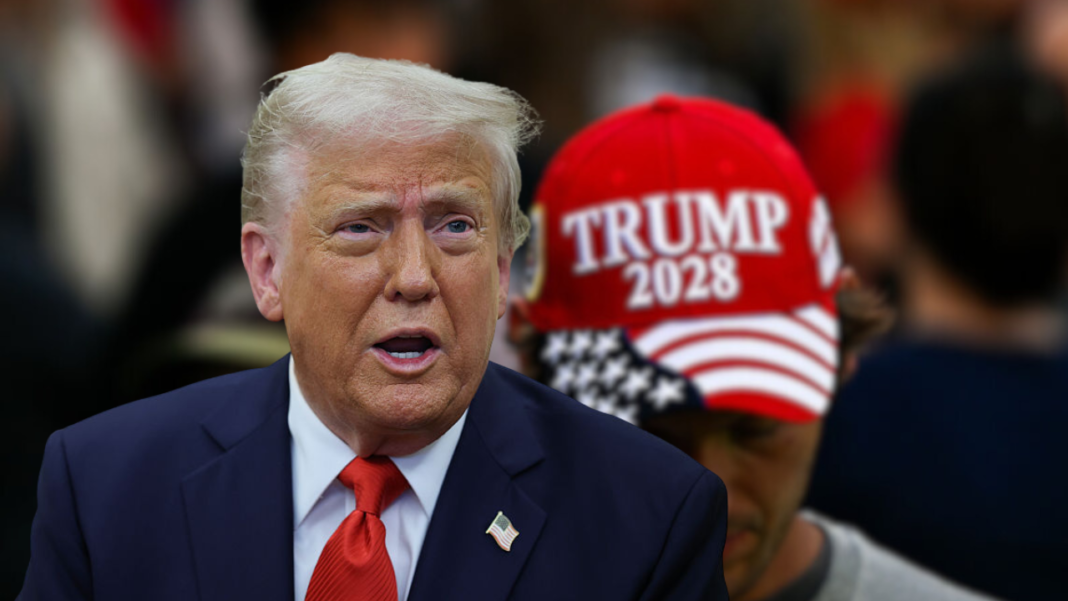The Controversial Idea of Trump’s Third Term: A Closer Look
The notion that Donald Trump could somehow serve a third term in office has stirred conversations, speculations, and controversies among political analysts and the public alike. Although he was the 45th president and is currently running for a second term, the idea of a potential third term has emerged, largely fueled by Trump and his allies.
The Origin of the Third-Term Concept
The seeds of this unconventional theory can be traced back to statements made by former White House advisor Steve Bannon. Recently, Bannon hinted that there are “plans” in place for Trump to run in 2028, claiming an air of inevitability around the prospect. He stated, “He’s going to get a third term… people just ought to get accommodated with that,” providing a sneak peek into the mindset surrounding this controversial idea.
Bannon’s assertions are at odds with the U.S. Constitution, specifically the 22nd Amendment, which limits an individual to two elected presidential terms. America’s foresight in creating this amendment was meant to prevent any compromise to the democratic principles that underpin the nation. Despite this legal barrier, Bannon’s rhetoric suggests a belief that some form of workaround may exist.
The Role of Merchandise and Publicity
Trump’s organization has even taken bold steps to keep his name in the spotlight, including selling “Trump 2028” merchandise. This tactic not only plays into the narrative that he is still a significant figure on the political stage but also reinforces the idea that a third term remains a possibility. Earlier this year, hats emblazoned with the “Trump 2028” slogan were highlighted during a meeting in the Oval Office, bringing the concept into everyday political discourse.
Bannon’s Vision of Leadership
Bannon has described Trump in almost mythical terms, considering him a “vehicle of divine providence.” He argues that the country “needs him to be president of the United States,” emphasizing the idea that Trump’s leadership was divinely ordained. Such statements invite a mix of admiration and skepticism, showcasing how deeply some of Trump’s supporters view his potential return.
While discussing the pathway for Trump’s continued influence, Bannon acknowledged that any re-election would only stem from “the will of the American people, and the will of the American people is what the Constitution embodies.” This remark underscores the tension between popular opinion and constitutional law, a dynamic that has come to define much of Trump’s political strategy.
Revisiting January 6th: A Turning Point
Bannon’s role in the events surrounding January 6, 2021, cannot be overlooked. After Trump lost the election to Joe Biden, Bannon allegedly advised on efforts to overturn that result, culminating in the chaotic Capitol insurrection led by Trump supporters. His subsequent legal troubles—serving four months in prison for contempt of Congress—have only added to the complexity of his influence within Trump’s inner circle.
Constitutional Impediments
Legally, Trump remains ineligible for a third term unless the 22nd Amendment is amended—a daunting task. Achieving such an amendment would require either a two-thirds majority in Congress or ratification by three-fourths of U.S. states. Given the deep partisan divides, such an outcome seems improbable, underscoring the futility of Bannon’s grand plans.
Politicians Weigh In
Democratic strategist Joel Payne has spoken critically about the ongoing discussions surrounding Trump’s potential for a third term, suggesting they serve more to maintain Trump’s relevance than any real likelihood of fruition. He describes Trump as a “lame duck,” asserting that the former president knows the rules of the Constitution apply to him and that perpetuating this narrative is a way to maintain his influence.
The Public’s Perception
As the 2028 election looms closer, the concept of a third term is becoming more than just a curiosity; it has implications for voter mobilization and party dynamics. Supporters may galvanize around the idea, treating it as a rallying cry, while detractors see it as a dangerous deviation from constitutional norms.
In an environment ripe with political polarization, the conversations surrounding Trump’s possible third term reflect broader concerns about governance, legal integrity, and the future of democratic institutions in America. This ongoing dialogue serves as a testament to the deeply rooted complexities that define modern politics in the United States.



